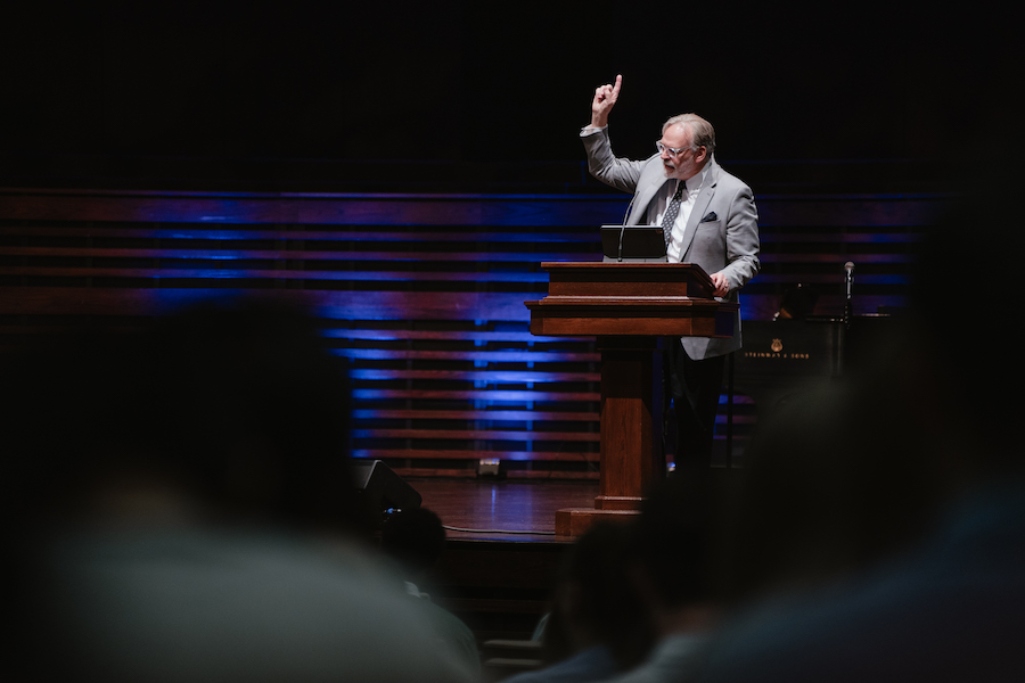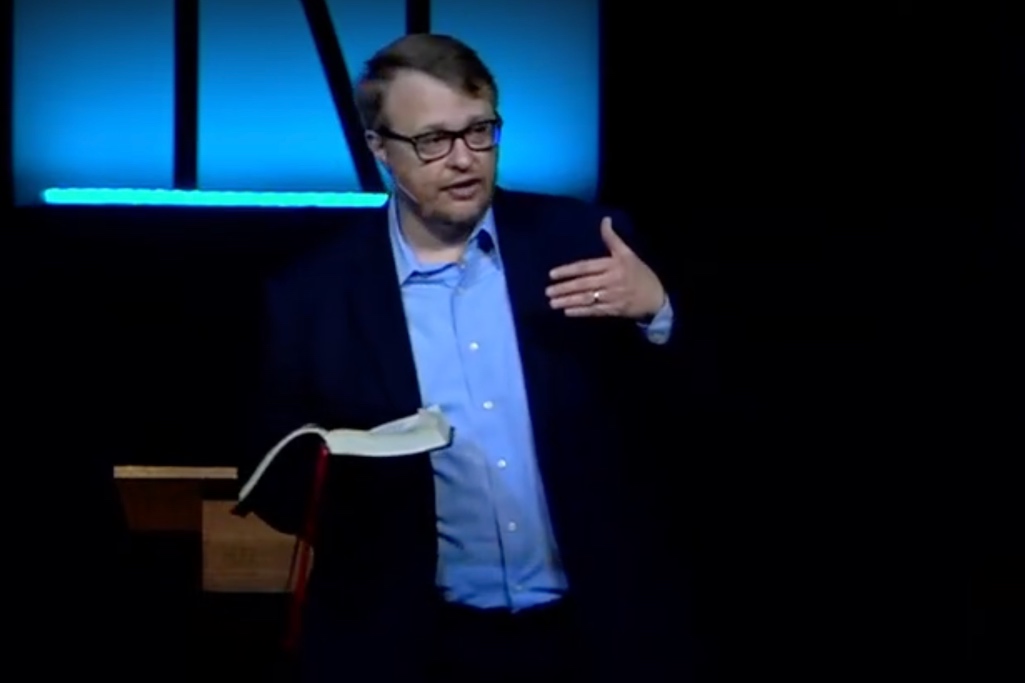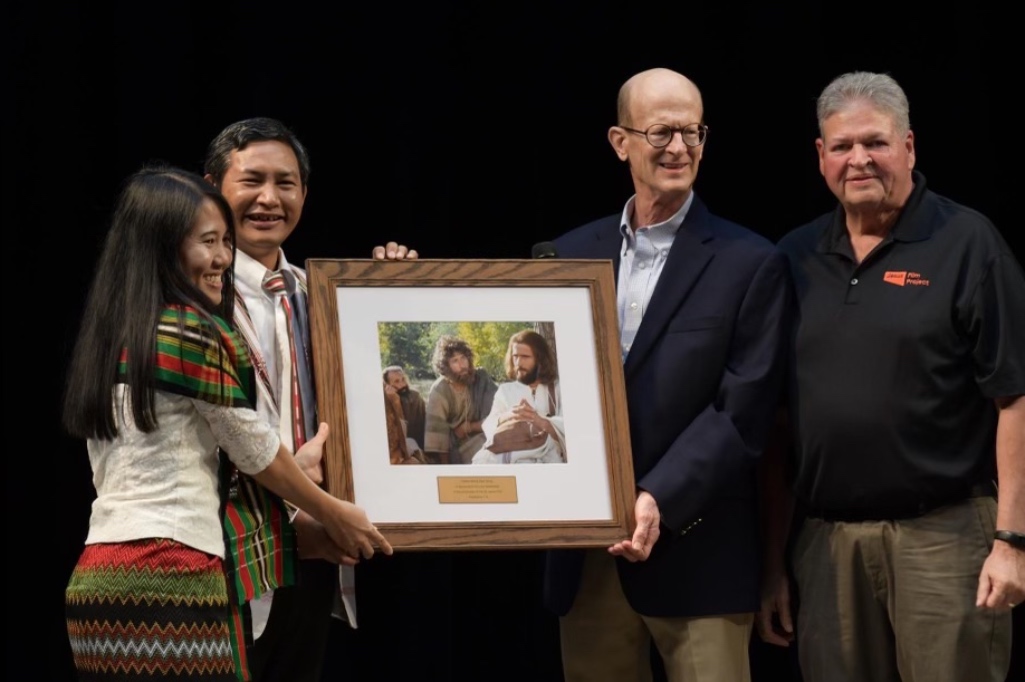
Malcolm Yarnell, research professor of theology at Southwestern, preaches during the Sept. 9 chapel service at SWBTS celebrating the 1,700th anniversary of the Council of Nicaea.
FORT WORTH, Texas — The Sept. 9 chapel service at Southwestern Baptist Theological Seminary (SWBTS) was a celebration of the 1,700th anniversary of the Council of Nicaea, which gave Christians a foundational statement summarizing biblical truth about the Trinity and especially Jesus Christ. Malcolm Yarnell, research professor of theology at Southwestern, who has written and spoken extensively on the topic, preached a message drawn from passages in Paul’s letter to the Colossians.
In introducing the theme of the special chapel service, President David S. Dockery provided a historical background about how the Nicene Creed resulted from “a very serious matter having to do with whether or not we could say Jesus Christ is fully God,” he said.
Roman Emperor Constantine called a council together in A.D. 325 that, after a two-month debate, affirmed the Trinity and the full deity of Jesus Christ, he said. After reading from Matthew 16:13-16 where Simon Peter affirms that Jesus is the Son of God, Dockery asked the audience to stand and recite together the Nicene Creed.
“Let us not just read this,” he urged, “but let us affirm it. Let us confess it with conviction, understanding who our Lord Jesus Christ is.”
Yarnell, citing polls in recent years that “repeatedly demonstrate evangelicals today must recover Nicene orthodoxy,” went on to explain why.
“Well, we were warned,” he said, noting that in the early fourth century, the church suffered what Jesus and His apostles had foretold about false prophets coming to lead people astray. God allowed these heresies so that the approved could be recognized among them, Yarnell said, quoting 1 Corinthians 11:19.
“Little over two centuries after the apostles exposed various heretics, the church confronted the greatest heretic in history,” he added in reference to Arius, who denied Christ’s deity. “It was the early fathers’ privilege to be used by God to craft a disciplinary creed at a lakeside basilica in Northwest Asia Minor, modern Turkey. We celebrate today their biblical exegesis, which exalts Jesus Christ in the Trinity.”
Yarnell said many people ask why he and other Southern Baptist theologians proposed that the Southern Baptist Convention add the Nicene Creed to the Baptist Faith and Message.
“I do not advocate Nicaea for the sake of upholding tradition, nor to refute errant anthropologies, nor to offend the weak who decry subscription,” he explained. “I advocate Nicene orthodoxy because I love Jesus and want His church to glorify Him.
“Our end is not to protect biblical anthropology, nor to promote orthodox scholars, nor to preserve unity with the universal church,” Yarnell continued. “Good and right as those are, they are not our goal. Rather, we offer God’s people the knowledge of God’s mystery, the Person of Jesus Christ, because the complete measure of theological wisdom is found entirely in Him.”
Yarnell walked his listeners through Colossians where Paul writes about the preeminence of Christ. He noted in 1:15-17, Paul teaches that Christ is preeminent over His creation; in 1:18-20, Christ is preeminent over redemption; and in 3:1-4, Christ is preeminent over consummation.
Christ is “before, after, above, under everything,” Yarnell declared.
In asking who Christ is, Yarnell said the answer “is so mysterious that only God the Father can reveal it, so profound that only God the Son can verbalize it, so deep only God the Spirit can illumine it, and so important that your eternal state depends upon your correct answer. ‘But you, who do you say that I am?’ is the existential question Jesus poses to every human being.”
But in dying for our sins and through His resurrection, Christ declared victory over everything, Yarnell said, adding, “He requires not our power to make Him what He is. Instead, God requires men and women to receive Christ by grace through the Spirit’s gift of faith. Christ reveals Himself through our proclamation of His gospel.”
Yarnell concluded by challenging the audience: “The critical question is, ‘Do you believe in Him?’”
The music for the service, led by Charles Lewis, associate dean of the School of Church Music and Worship, was in tune with the celebration. At the beginning of his comments, Yarnell thanked Lewis for leading the opening hymn, “Holy, Holy, Holy,” stating that, “in the dearth of preaching about God as Trinity that occurred since the Enlightenment,” he was convinced that it was the musicians who, “for most evangelical churches, kept us orthodox.”
Following Yarnell’s sermon, Lewis said “we close in praise as we worship Jesus Christ, who is God the Son, through the Spirit, to the glory of God the Father” before leading the audience in singing the hymn “All Creatures of Our God and King.”
Yarnell earned his master of divinity degree from Southwestern in 1991 and also holds degrees from Duke University and Oxford. In addition to teaching, he serves as editor of the Southwestern Journal of Theology, is the author of several books, and has presented lectures at seminaries and universities around the world.
Yarnell’s entire message can be viewed here.


